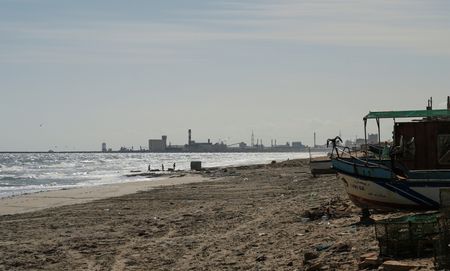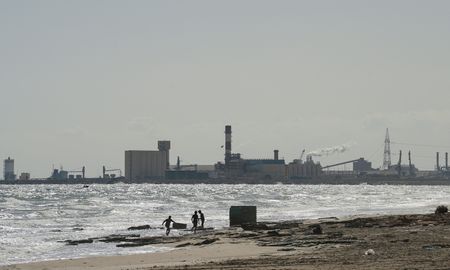By Tarek Amara
TUNIS (Reuters) -A general strike and tens of thousands of protesters brought the southern Tunisian city of Gabes to a standstill on Tuesday to back demands for the closure of a state chemical plant blamed for a pollution crisis.
A recent spate of environmental and anti-government protests prompted by a worsening economic crisis and disruptions in public services has posed the biggest challenge to President Kais Saied since he seized all power in 2021.
Shops, markets, schools, and cafes shut down in the general strike, paralysing economic activity in coastal Gabes in response to a call by the powerful UGTT labour union.
Crowds held up banners condemning the environmental pollution caused by the CGT phosphate plant over the years that critics say now threatens the health of thousands of residents.
Protesters marched through the city chanting slogans such as “Gabes wants to live” and “dismantle the polluting units.”
Saied, seeking to defuse the discontent, said earlier this month that Gabes was suffering an “environmental assassination” due to what he called criminal policy choices by previous Tunisian authorities, blaming them for widespread cancer and respiratory illness and the destruction of local ecosystems.
Protesters rejected Saied’s stance, saying a government failure to take decisive action to shut down the chemical complex would worsen the health and environmental crisis.
Health Minister Mustapha Ferjani said on Monday the government would build a cancer hospital in Gabes to deal with rising cases but gave no timetable.
Saied’s government is concerned the Gabes unrest might heighten discontent simmering in other regions where protests over high unemployment and water cuts occur regularly.
Pressured by a deep financial crisis, his government needs to balance public health demands with the production of phosphate, Tunisia’s most valuable natural resource.
A CGT-commissioned audit in July seen by Reuters found serious violations of national and international standards at the plant, which dumps 14,000-15,000 tons of phosphogypsum daily into waters along the Mediterranean coast, along with high ammonia, nitrogen oxide and sulfate emissions.
Environmental groups warn that marine life has been severely affected, with local fishermen reporting a dramatic decline in fish stocks over the past decade, hitting a vital source of income for many in the region.
(Reporting by Tarek Amara; editing by Mark Heinrich)









